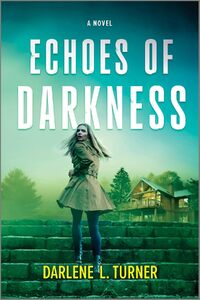 ECHOES OF DARKNESS |
 Fall headfirst into July’s hottest stories—danger, desire, and happily-ever-afters await. |

Purchase
Worldwide Library Mystery Excerpt of Crazy Eights by Elizabeth Gunn"WHAT ARE WE doing here," I asked Trudy, one hot Sunday morning in May, "raising potatoes for the whole town of Mirium?" "Enough for us and the two Sullivan families for all winter, that's the deal." The deal dominated our lives now, an unintended consequence of falling in love. We work eighty miles apart; I'm chief of detectives in Rutherford, Minnesota, and Trudy's a forensic scientist at the Bureau of Criminal Apprehension in St. Paul. When we were seized with the desire to live together we bought a small farm just outside the small town of Mirium, midway between our jobs. It seemed like a perfect solution till a winter in the antique farmhouse made us realize it lacked a few amenities, like heat and insulation. Short on cash, we cobbled together a contract with two local carpenters that featured complex webs of barter and sweat equity. The Sullivan brothers got the use of our hay- fields and barn, and on weekends I became their unpaid serf and gofer while they rebuilt the house. Trudy was raising a garden the size of a battleship, with the bulk of the produce committed to the Sullivan families. I was free to help her in the garden this Sunday because my new slavemasters had gone fishing in what used to be my personal boat. It was still registered in my name, and I had paid the license, but they were using it more than I was. It was all part of the deal. Which after all, as Trudy had several times reminded me, was only going to last three years. "And only in the summer at that," she said. "Which is when you mostly use a boat in Minnesota." "Well, granted. But by the third summer the house will be finished. Then you'll only have to help me with the garden and do two or three haying weekends." "Ah, the haying weekends." Ozzie Sullivan had begun smiling at me in a predatory way whenever he mentioned his ripening hay crop. He was looking forward to breaking the city boy's balls, I figured. "Maybe I'll turn out to be no good at haying. Ozzie might have to fire me off that job." "In your dreams." Trudy giggled. "Haying isn't complicated; it's just hard. Let's have a cup of coffee before we plant the carrots." We sat in our torn-up kitchen with the door open, enjoying an odd kind of luxury. With the ceilings and most of the interior walls torn out, we couldn't keep the house clean so we didn't have to try. And we were working too hard to worry about calories, so we both put cream and sugar in our coffee and ate glazed doughnuts from Leon-ard's Cafe in town. "I'd like to get the peas and beans planted this weekend too," Trudy said. "In case you get too busy to help me later." "You don't have to worry about that," I foolishly said. "I'm already working all the time I'm awake — how could I get any busier?" That question was answered at four the next morning, when Captain Russ Swenson's phone call woke me. "Heads up," he said, in his bugle-call voice. "Glah?" "Got a job for you. You awake now?" I could feel the phone vibrate. "Mmm." "Shelley Gleason's disappeared. Remember her?" "Uh." I didn't. "Big basketball star at Central High, three-four years ago, later on at the U? Works at IBM now, know who I mean?" "Ah." I was looking at my watch. Too early to get up and too late to go back to sleep. Damn. "Well, Greeley's just filing the report. She went out to do an errand last night about nine o'clock and she hasn't come back." "Why are you calling me?" It was a reasonable question. My job carries heavy responsibilities but responding to street calls is no longer one of them. Besides, we hardly ever declare an adult missing in the first twenty-four hours. A high percentage of young women who don't come home when they're expected turn up in due time, embarrassed but unharmed. "I think we're looking at a high-profile case here, Jake. Ten-twelve people already, got up outa bed to call and tell me Shelley Gleason's not the kind to get lost and she would never run away. Dispatch's been busy ever since the first call came in, and soon's all them IBM-ers get to work, it's gonna be a real zoo around here. Half the people in town know this girl, and they all want her found an hour ago. Her family's on the way in to talk to you." "I hear you," I said. "I'll be right in, Russ." I slid out of bed as quietly as I could, trying not to wake Trudy, who had rolled onto her stomach when the phone rang and pulled a pillow over her head. Coming out of the shower five minutes later, I stood by the bed, looking down at the sweet curve of her shoulder while I buttoned my shirt, thinking how it would feel to wake up and find her gone from there. I never quite get over the luck of it: I was rescued as a foundling from a Dump-ster, an ugly duckling that grew into an ugly duck, with indeterminate brown skin and a mixed-race face that looks like it was made by a committee. But this smart, beautiful blonde likes me. Go figure. Somehow she sensed me watching her, came out from under the pillow with her eyes open and said, "What?" I laughed and leaned down and kissed her. She smelled like raw potatoes and dirt. I whispered, "I think you're the sexiest farmer in the Upper Midwest." "Shee." She giggled, turned over and went back to sleep. She didn't even ask where I was going. We'd been living together nine months; she knew why cops get early calls. Phones were ringing all over the second floor as I came through the door of the Government Center at five minutes to five. Shelley Gleason's family was waiting for me at the top of the stairs. I remember it as the day I never did get a cup of coffee. IN SCHOOL I REMEMBER reading that the wheels of justice grind slowly but exceedingly fine. I'm still not sure how fine the grind is, but in the fifteen years I've been a cop, either the wheels have slowed down some or I've lost a little patience. Getting Shelley Gleason's kidnappers into court, for instance, seemed to take, as Chief Frank McCafferty remarked one day when his lunch wasn't sitting right, "absolutely goddamn freaking forever." Not really forever, but a year and two weeks passed before the first of the two killers was tried and convicted. And it was four months after that, the middle of August, by the time the county attorney finally got a firm court date for the second man. "And this was such a simple case," the chief said. "What would we do with something complicated?" A car-jacking that turned into murder, it did seem simple enough, at the time. We tracked Shelley's missing Ford Explorer through her credit cards, following ATM withdrawals and gas purchases to LaCrosse and most of the way back. When we stopped the car near the east edge of Rutherford five days after her disappearance, Shelley Gleason wasn't in it. But nobody in Hamp-stead County law enforcement was very surprised to hear that one of the two men running away from it was Benny Niemeyer. Recently paroled from Stillwater after serving half of a two-to-five for auto theft, Benny at twenty-two had changed woefully little from the hyper-thyroid, attention- deficit kid he'd been in seventh grade, when he quit terrorizing teachers and dropped out of school to devote himself to troublemaking full time. Since then he had racked up a consistent record as a small-time thief, hooligan, and pain in the ass. The other fool wasting a beautiful May morning trying to outrun six law enforcement officers was Dale Trogstad, whose previous offenses were mostly break-ins and pilfering. Dale hadn't done any serious time — he even had a home address and a record of occasional employment — so initially my detectives and I were inclined to view him as the hapless helper in this crime. Shelley Gleason was still missing, and common sense argued against optimism, so we figured we were looking for one or more murderers, and Benny Niemeyer fit the mold. The chief agreed. "Niemeyer's been a criminal all his life," he said. "He's never killed anybody before that I know of, but if he's crossed that line now we better put him away for good, because Benny never quits anything till we make him quit." I didn't argue. The community was outraged that Shelley Gleason had been snatched off the street. "Right here in Rutherford, Minnesota, for heaven's sake." Nobody wanted to hear about our low crime rate. "That didn't help Shelley any, did it?" my barber said peevishly. So I put all my People Crimes staff to work, digging up incriminating evidence on Niemeyer. It wasn't hard to find; everybody we talked to told another Big Bad Benny story. Triple-B's, the People Crimes section began calling them, as Benny's three-ring binder fattened with tales of a gang fight that spread over three city blocks, a meth lab that smelled so bad the rats left the house, and a party that got so loud the prostitutes next door called the cops. The Ford Explorer yielded fingerprints of both suspects, and we had two guns and a few DNA samples making stately progress through the queues at the state crime lab. Benny regaled us with hours of nonsense chatter before he finally asked about an attorney. "Seems like he's enjoying the visit, doesn't it?" one detective said. Dale Trogstad made an immediate request for an attorney and lapsed into silence. Once we found Shelley's body, though, most of the physical evidence pointed to Dale, so County Attorney Milo Nilssen wanted to try him first. Against our best instincts, the chief and I and four People Crimes detectives yielded to his judgment. It turned into a solid home run for Milo, a conviction of Murder One after only four hours of deliberation by the jury. Perversely, instead of increasing his confidence for the second trial, the Trogstad win made Milo even more uneasy about how thin the evidence was against Benny. "Come on," I said, "it's a lock. You already got a conviction on the partner everybody thought was innocent." "Oh, yeah. Mr. Sweetface." Milo had built up a monumental grudge against Dale Trogstad in the course of his trial. It compounded the felony, for him, that Dale could sit there looking like an altar boy after murdering a blameless girl for no reason. Milo's resentment wasn't entirely irrational: Trogstad's unmarked, boyish features had made getting a conviction harder than it should have been. Milo used all his smarts and every bit of the fingerprint, ballistic and DNA evidence my squad compiled for him, and in the end, despite the fact that two of the younger females on the jury wept while the verdict was read, Dale Trogstad got life without parole. The pre-trial hearing in the Niemeyer case was three months later in Judge Dotzenrod's courtroom. It was the kind of a session only a lawyer could love: long dry discussions about records and exhibits, and nearly inaudible wrangling over language and protocol that made me long to yell, "Who the hell cares?" The session only caught fire once, over the defense attorney's objection to introducing the taped conversation in which Benny directed us to the body of the victim. I had urged the county attorney to use it, insisting it was a key piece of evidence. "I don't think I'll ever get it in," Milo said, "because you got those directions after he asked for an attorney." "He volunteered the information. What are we supposed to do, tape their goddamn mouths shut?" Excerpt from Crazy Eights by Elizabeth Gunn |
|
| |||
|
||||



 © 2003-2025
© 2003-2025